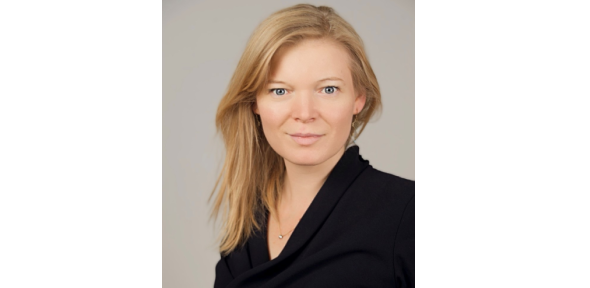
Magdalene College
CAMBRIDGE
CB3 0AG
United Kingdom
Annja Neumann is an Affiliated Lecturer in Modern German Studies and Isaac Newton Trust Post-doctoral Research Fellow in Digital Humanities. Her practice-based research explores the staging of spaces and politics of embodiment, with a particular interest in the theatricalisation of medical spaces. Before taking up her post at Cambridge Digital Humanities (CDH), Dr Neumann was Research Associate of the AHRC Schnitzler Digital Edition Project at Cambridge. After studying German and Cultural Anthropology at the Universities of Heidelberg and Uppsala, she came to London for her PhD, which she completed at Queen Mary in 2012. Following on from her research on temporalities and historicities of post-1945 German poetry, she currently works on embodied space, digital dramaturgies, and medical scenography, drawing on her training as a cultural anthropologist.

Topics on which Dr Neumann teaches include German literature and literary theory, from 1800 to the present day. Lyric poetry in relation to poetics and methodology is a special interest, and she has taught poetry from Goethe to Grünbein at both undergraduate and postgraduate levels. She also has a strong interest in critical theory and interrelations between literature and history. In addition, she has taught seminars on Georg Büchner, and on autobiographic writing ranging from Goethe and Marie von Ebner-Eschenbach to Klaus Mann and Ingeborg Bachmann. She supervises a wide range of papers from the MMLL Tripos: currently, she is lecturing on the Ge6 paper ‘Modern German Culture from 1890 until the present day’, including the module ‘Sexuality and the Unconscious’.
She also teaches Digital Humanities and the Medical Humanities, including optional dissertations/ Part II Projects for medical and veterinary students on ‘The Spectacle of Dissection’ and ‘Anatomies of Online Teaching’ at the Physiology, Development and Neuroscience Department. She supervises MPhil students in European, Latin American and Comparative Literatures and Cultures, particularly on Viennese modernism and theories of time and space.
Dr Neumann’s research addresses the fields of German Studies, Theatre and Performance Studies, Digital Humanities, Critical Medical Humanities and the Visual Arts. Her practice-based research explores the staging of spaces and politics of embodiment, with a particular interest in medical spaces. Accordingly, the scenography of her interdisciplinary work concerns questions of embodiment (how are bodies materialised and how does ‘the digital’ change the experience of embodiment, and produce new perspectives in different media?), agency (how are iterative changes of practices enacted, and what reconfigures the possibilities of action?) and medical epistemologies (how is knowledge produced, and how are boundaries redrawn?).
Her current book project examines the afterlife of Rembrandt van Rijn’s canonical painting The Anatomy Lesson of Dr Nicolaes Tulp (1632). It covers a range of different media from the late nineteenth century to the present day, drawing on her work as a dramaturg, and her contributions to the Tripos in Medicine.
Rembrandt’s group portrait The Anatomy serves as the basis for a number of workshops, projects and theatre performances produced and co-directed by Dr Neumann. These include the production of the medical drama Professor Bernhardi by Arthur Schnitzler (London premiere: 2015), with the international theatre company Foreign Affairs, a reperformance of The Anatomy at CRASSH, and more recently a set of live-streamed online performances entitled Dr Tulp and the Theatre of Zoom (premiered in 2019). In addition, she is the author of a book on post-1945 German poetry and aesthetic temporality, particularly Nelly Sachs’ and Paul Celan’s poetry (Durchkreuzte Zeit, 2013), and the lead editor of the critical digital edition of the puppet plays Marionetten by Arthur Schnitzler (first released in 2018). Her publications in the areas of Medical Humanities and Digital Humanities include a 360-degree story-telling platform Schnitzler: Story: Spheres (released in 2019).
Dr Neumann welcomes inquiries from potential MPhil students with research topics that correspond to her interests:
▪ Poetics after 1945 (esp. Paul Celan and Nelly Sachs and the topic of time)
▪ Lyric poetry (from an Anglo-German perspective)
▪ Viennese Modernism (esp. Arthur Schnitzler)
▪ Digital Humanities and Digital Pedagogy esp. virtual reality/augmented reality and XR reality performance
▪ Critical Medical Humanities (esp. medical spaces, medical epistemologies)
▪ History of Medicine (anatomy teaching from the Renaissance to the present day)
▪ Performance and Medicine
▪ Aesthetic responses to the Covid-19 Pandemic
▪ 21st -century German literature and visual culture
▪ Methodologies in literary criticism
▪ New materialisms (esp. entanglements between theatre and medicine)
▪ Staging Relations: Theatre, Technology and the Body (current book-project)
▪ Re-Staging Public Spaces (2021-2023)
▪ The Afterlives of Dr Tulp (2016-2024)
▪ Walking the Landscape, in collaboration with the Cambridge University Library & the Fitzwilliam Museum (ongoing)
▪ Reading Bodies, International Research Network (2023-2024)
Theatrical Materialism: Materiality, Presence and Theatricalisation in medical and digital Spaces (current book project)
Anglo-German entanglements between literature and the sciences (forthcoming) Looming Futures, an interactive theatre performance (forthcoming)
(selection)
- Annja. Neumann with Uta Baldauf, ‘Waiting Room: Material Moments of Making Medicine as Performance’, Routledge Companion to Performance and Medicine (London and New York: Routledge: forthcoming in January 2024), pp. 442-448, DOI: 10.4324/9781003036500-47.
- Annja Neumann, Carina Westling, Wendy Bevan-Mogg, Dr Tulp and the Theatre of Zoom (online live performance), set of 16 live performances, premiered on 16-17 July 2020 on Zoom, (PaR output, documented on video film here: https://sms.cam.ac.uk/media/329187).
- Wrestling with Marionettes: The entangled embodiment of humans and machines in Schnitzler’s posthuman theatre’, Placing Schnitzler, a special issue for Austrian Studies 27 (2019), ed. by Judith Beniston and Andrew Webber. DOI: https://doi.org/10.5699/austrianstudies.27.2019.0163
- Cutting Text: Doctors as Writers. A short film on text genetic editing, in: Frederick Baker, Annja Neumann, Andrew Webber, Schnitzler: Story: Spheres:, six interactive digital panoramas and learning tools (Cambridge 2019, online resource). URL: http://schnitzler-spheres.lib.cam.ac.uk
- Arthur Schnitzler, Marionetten. Ed. by Annja Neumann with Gregor Babelotzky, Judith Beniston, Kaltërina Latifi, Robert Vilain, Andrew Webber. In: Arthur Schnitzler digital (Werke 1905 bis 1931). Ed. by Wolfgang Lukas, Michael Scheffel, Andrew Webber, Judith Beniston (Cambridge, first released in 2018). URL: https://www.schnitzler-edition.net/genetisch
- ‘Schnitzler’s Anatomy Lesson: Medical Topographies in Professor Bernhardi’, Jahrbuch Literatur und Medizin, Bd. 8, ed. by Christa Janson and Florian Steger (Heidelberg: Universitätsverlag Winter, 2016), pp. 31-60. https://www.winter-verlag.de/en/detail/978-3-8253-7671- 0/Jahrbuch_Literatur_u_Medizin_Bd_8_PDF/
- ‘Verbindungslinien: Nelly Sachs, Emily Dickinson und Paul Celan‘, Eine Schwester Kafkas? Nelly Sachs im Kontext, ed. by Florian Strob and Charlie Louth (Heidelberg: Winter 2014), pp. 179-200.
- Durchkreuzte Zeit. Zur ästhetischen Temporalität der späten Gedichte von Nelly Sachs and Paul Celan (Heidelberg: Winter, 2013). http://www.winter-verlag.de/en/detail/978-3-8253-6225- 6/Neumann_A_Durchkreuzte_Zeit/
Practice as Research: public theatre productions:
- Annja Neumann (producer & co-curation), Lea Luka Sikau, Isaac Sebenius, Rowan Williams: A Cambridge Celebration – A Concert in Response, for voice and piano, as part of the ‘Rowan Williams: A Cambridge Celebration’ conference, Trinity College Chapel, Cambridge, 11 September 2023. (Practice as Research (PaR) output).
- Annja Neumann (producer & co-direction), Syamala Roberts, Lea Luka Sikau, After Abstraction: experimental multimedia performance with vocal ensemble, The Robert Cripps Gallery, The New Library, Magdalene College, Cambridge, 25 February & 17 March 2023 (PaR output).
- Annja Neumann, Alexander Mentzel, Faust Shop: New Lands, mixed-reality performance, premiered in The Grafton Centre, Sook Space Cambridge on 16-17 June 2022 (PaR output, trailer available here: https://rb.gy/rx2cno).
- Dr Tulp and the Theatre of Zoom, co-produced and directed live performances by Annja Neumann in collaboration with artistic producer Carina Westling and scriptwriter Wendy Bevan-Mogg, premiered online on 16-17 July 2019.
- The Great Wurstel, a site-specific theatre performance in collaboration with the Cambridge University Library and an interdisciplinary team of students, artist Richard Wentworth and professionals, premiered in Cambridge University Library (25.04.2019)
- Professor Bernhardi by Arthur Schnitzler, produced in collaboration with the Department of Physiology, Neuroscience and Development (Cambridge) and the theatre company [Foreign Affairs], Festival of Ideas, Anatomy Lecture Theatre, Cambridge (28-29.10.2016)
- Professor Bernhardi by Arthur Schnitzler, in collaboration with theatre company [Foreign Affairs], Barts Pathology Museum, London (September 2015)
Public Engagement (selected outputs)
Articles
- ‘Paul Celan’, Introduction to German-language Literature Website https://sites.google.com/site/germanliterature/20th-century/celan (general introduction to Celan’s life and his poetry)
Podcast
- Dying Well Podcast based on the ‘Dying Well: Enacting Medical Ethics’ symposium at Barts Pathology Museum London (September 2017, website discontinued)
Blog posts
- ‘Of Constable-bows and rainbows’, Walking the Landscape: Constable Blog, published on 1 Sep 2022, URL: https://walking-the-landscape.fitzmuseum.cam.ac.uk/blog/consta-bows/.
- ‘The Many Masks of Dr Tulp’, URL: http://www.crassh.cam.ac.uk/blog/post/themany-masks-of-dr-tulp (August 2019)
- ‘Theatres of Medicine, Inside and Outside the Hospital’, URL: https://www.magd.cam.ac.uk/news/theatres-of-medicine (April 2019)
- http://www.winter-verlag.de/en/detail/978-3-8253-6225-6/Neumann_A_Durchkreuzte_Zeit/
Link to Publications



